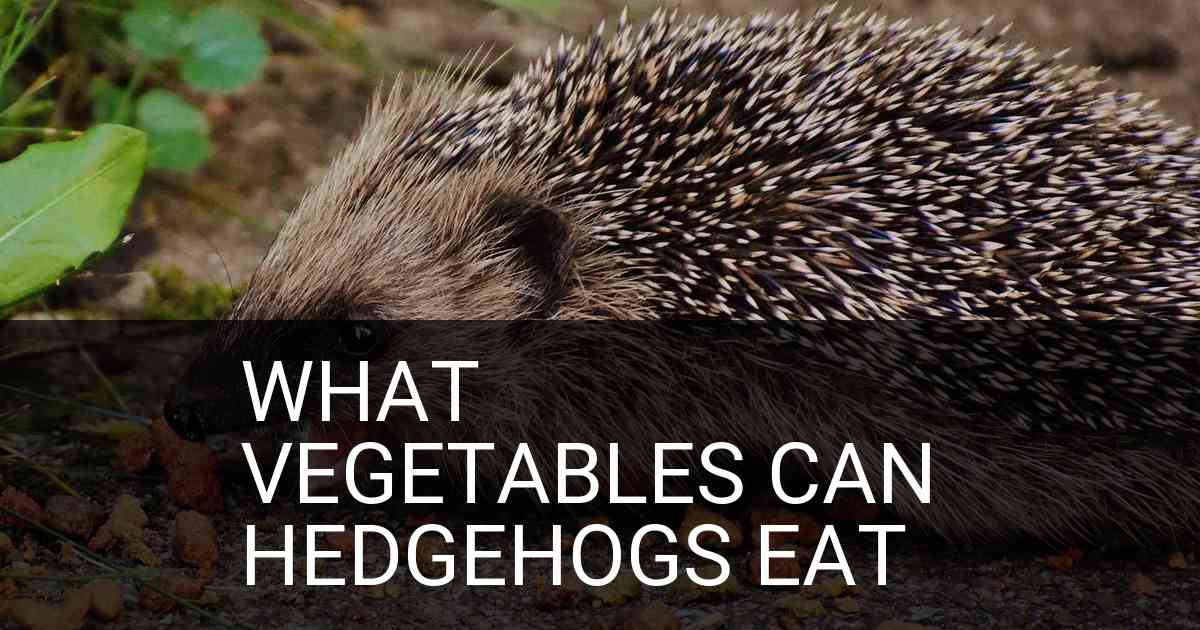
When it comes to having a healthy and happy hedgehog, providing them with the right nutrition is essential. But what exactly should they be eating? Many people are curious about which vegetables can hedgehogs eat. To help answer this question, let’s explore some of the most common types of veggies that are safe for these little critters to enjoy. We’ll also provide some tips on how to feed them properly so you can ensure your pet is getting all the nutrients they need!
What Vegetables Can Hedgehogs Eat?
Hedgehogs can enjoy a variety of vegetables, including dark leafy greens such as kale and spinach, bell peppers, carrots, squash, sweet potatoes, and zucchini. Fruits like apples and berries are also safe for hedgehogs to eat in moderation.
Tips For Feeding Your Hedgehog Vegetables:
- Make sure the vegetables are cut into small pieces so they’re easy to eat.
- Avoid giving your hedgehog raw onions or garlic as these can be toxic.
- Wash all fruits and vegetables before feeding them to your pet.
- Provide fresh water daily for your hedgehog to stay hydrated.
Common Foods to Avoid Feeding Hedgehogs
Hedgehogs can make great pets, but it is important to know what not to feed them. Poor nutrition can lead to health issues like obesity and diarrhea. Here are some of the most common foods that should be avoided when feeding hedgehogs:
1. Dairy Products
Dairy products such as milk, cheese, yogurt, and ice cream should never be given to hedgehogs. These foods are difficult for their digestive systems to process and can cause intestinal distress.
2. Avocado
Avocados contain a toxin called persin which is toxic for hedgehogs. Eating even a small amount of avocado can cause vomiting and diarrhea.
3. Chocolate
Chocolate contains caffeine and theobromine which are both harmful for hedgehog’s bodies in large doses. Eating chocolate could lead to seizures or heart problems.
4. Onions And Garlic
Onions and garlic contain compounds which can irritate the stomach of hedgehog leading them to suffer from serious gastrointestinal problems. Even if they eat just a small amount, it could still have serious consequences.
5. Sugary Snacks
Sugary snacks such as candy, cookies, cake, etc., should be avoided at all costs since these items have no nutritional value whatsoever. They will only contribute empty calories which could lead to obesity over time.
What Types of Fruits and Vegetables Can Hedgehogs Eat?
Hedgehogs are omnivorous animals, meaning they can eat a variety of foods, including fruits and vegetables. It is important to provide your hedgehog with a balanced diet that meets their nutritional needs. This includes providing them with a variety of fruits and vegetables as part of their diet.
Fruit
When selecting fruit for your hedgehog, look for varieties that are rich in vitamins and minerals. Some good choices include:
- Apples (no seeds or stems)
- Bananas
- Blueberries
- Cherries (remove the pits)
- Mango
- Melon
Vegetables
Vegetables should make up 25-30% of your hedgehog’s diet. Choose from dark leafy greens like kale, spinach and romaine lettuce, as well as other nutrient-rich vegetables such as:
- Broccoli
- Carrots (shredded or steamed)
- Peas
- Sweet Potato (cooked)
Giving Your Hedgehog the Right Diet
A hedgehog’s diet is composed of a variety of fresh vegetables and fruits, commercially-prepared hedgehog food, insects, and hard-boiled eggs. You should feed your pet at least once per day. It is important to provide a balanced diet that meets all their nutritional needs.
Vegetables and Fruits
- Dark green leafy vegetables such as kale, collard greens, mustard greens and spinach are great sources of Vitamin A and calcium.
- Carrots are high in Vitamins A and C.
- Fruits such as blueberries, apples (without the seeds), strawberries, raspberries, melon, bananas etc. can be provided in small amounts.
Commercially Prepared Food
Commercially prepared hedgehog food should make up the majority of your pet’s diet. Look for foods specifically designed for hedgehogs which contain all essential vitamins and minerals in the correct proportion. Avoid feeding too much protein as this can lead to obesity.
Insects
Feeding your pet live insects such as mealworms or crickets provides them with additional protein. Live insects should only be fed occasionally due to their high fat content.
Conclusion
In conclusion, hedgehogs can enjoy a variety of vegetables as part of their diet. The best choices are dark leafy greens, squash, carrots, bell peppers, and green beans. These should make up the bulk of a hedgehog’s diet but other vegetables like cucumbers and peas can also be offered in small amounts as occasional treats. As with any pet food choice, it is important to consider safety first. All vegetables should be washed before offering them to your hedgehog and never feed them anything that has been cooked or seasoned.

